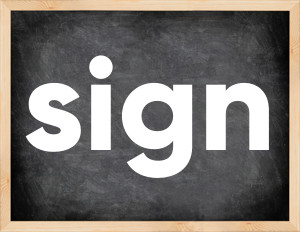 The English verb 'sign' is pronounced as [saɪn].
The English verb 'sign' is pronounced as [saɪn].
Related to:
regular verbs.
3 forms of verb sign: Infinitive (sign), Past Simple - (signed), Past Participle - (signed).
Here are the past tense forms of the verb sign
👉 Forms of verb sign in future and past simple and past participle.
❓ What is the past tense of sign.
Sign: Past, Present, and Participle Forms
| Base Form | Past Simple | Past Participle |
|---|---|---|
| sign [saɪn] |
signed [saɪnd] |
signed [saɪnd] |
What are the 2nd and 3rd forms of the verb sign?
🎓 What are the past simple, future simple, present perfect, past perfect, and future perfect forms of the base form (infinitive) 'sign'?
Learn the three forms of the English verb 'sign'
- the first form (V1) is 'sign' used in present simple and future simple tenses.
- the second form (V2) is 'signed' used in past simple tense.
- the third form (V3) is 'signed' used in present perfect and past perfect tenses.
What are the past tense and past participle of sign?
The past tense and past participle of sign are: sign in past simple is signed, and past participle is signed.
What is the past tense of sign?
The past tense of the verb "sign" is "signed", and the past participle is "signed".
Verb Tenses
Past simple — sign in past simple signed
(V2).
Future simple — sign in future simple is sign (will + V1).
Present Perfect — sign in present perfect tense is
signed
(have/has + V3).
Past Perfect — sign in past perfect tense is
signed
(had + V3).
sign regular or irregular verb?
👉 Is 'sign' a regular or irregular verb? The verb 'sign' is regular verb.
Examples of Verb sign in Sentences
- We can ask her to sign the copy (Present Simple)
- They signed a peace agreement in 1951 (Past Simple)
- The non-permanent members have signed only the German version (Present Perfect)
- This road has already been signed, although it was built only yesterday. (Present Perfect)
- The hostess signed for us to go inside. (Past Simple)
- He signed the contract without even looking at it. (Past Simple)
- I took a pen and signed. (Past Simple)
- He has signed up for a weekly newsletter. (Present Perfect)
- They signed each other's notebooks. (Past Simple)
- I will never sign it! (Future Simple)